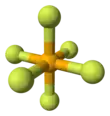Selenium hexafluoride
Selenium hexafluoride is the inorganic compound with the formula SeF6. It is very toxic colourless gas described as having a "repulsive" odor.[5] It is not widely encountered and has no commercial applications.[6]
| |||
| Names | |||
|---|---|---|---|
| IUPAC name
Selenium hexafluoride | |||
| Other names
Selenium(VI) fluoride, Selenium fluoride | |||
| Identifiers | |||
3D model (JSmol) |
|||
| ChemSpider | |||
| ECHA InfoCard | 100.149.506 | ||
PubChem CID |
|||
| RTECS number |
| ||
| UNII | |||
CompTox Dashboard (EPA) |
|||
| |||
| |||
| Properties | |||
| SeF6 | |||
| Molar mass | 192.9534 g/mol | ||
| Appearance | colourless gas | ||
| Density | 0.007887 g/cm3[1] | ||
| Melting point | −39 °C (−38 °F; 234 K) | ||
| Boiling point | −34.5 °C (−30.1 °F; 238.7 K) sublimes | ||
| insoluble | |||
| Vapor pressure | >1 atm (20°C)[2] | ||
| −51.0·10−6 cm3/mol | |||
Refractive index (nD) |
1.895 | ||
| Structure | |||
| Orthorhombic, oP28 | |||
| Pnma, No. 62 | |||
| octahedral (Oh) | |||
| 0 | |||
| Thermochemistry | |||
Std enthalpy of formation (ΔfH⦵298) |
1030 kJ/mol[3] | ||
| Hazards | |||
| Main hazards | toxic, corrosive | ||
| NFPA 704 (fire diamond) | |||
| Lethal dose or concentration (LD, LC): | |||
LCLo (lowest published) |
10 ppm (rat, 1 hr) 10 ppm (mouse, 1 hr) 10 ppm (guinea pig, 1 hr)[4] | ||
| NIOSH (US health exposure limits): | |||
PEL (Permissible) |
TWA 0.05 ppm (0.4 mg/m3)[2] | ||
REL (Recommended) |
TWA 0.05 ppm[2] | ||
IDLH (Immediate danger) |
2 ppm[2] | ||
Except where otherwise noted, data are given for materials in their standard state (at 25 °C [77 °F], 100 kPa). | |||
| Infobox references | |||
Structure, preparation, and reactions
Like many compounds of selenium, SeF6 is hypervalent. The compound has octahedral molecular geometry with an Se−F bond length of 168.8 pm.
SeF6 can be prepared from the elements[7] or by the reaction of bromine trifluoride (BrF3) with selenium dioxide. The crude product is purified by sublimation.
The relative reactivity of the hexafluorides of S, Se, and Te follows the order TeF6 > SeF6 > SF6, the latter being completely inert toward hydrolysis until high temperatures. SeF6 also resists hydrolysis.[3] The gas can be passed through 10% NaOH or KOH without change, but reacts with gaseous ammonia at 200 °C.[8]
Safety
Although selenium hexafluoride is quite inert and slow to hydrolyze, it is toxic even at low concentrations,[9] especially by longer exposure. In the U.S., OSHA and ACGIH standards for selenium hexafluoride exposure is an upper limit of 0.05 ppm in air averaged over an eight-hour work shift. Additionally, selenium hexafluoride is designated as IDLH chemical with a maximum allowed exposure limit of 2 ppm.[10]
References
- Lide, D. R., ed. (2005). CRC Handbook of Chemistry and Physics (86th ed.). Boca Raton (FL): CRC Press. ISBN 0-8493-0486-5.
- NIOSH Pocket Guide to Chemical Hazards. "#0551". National Institute for Occupational Safety and Health (NIOSH).
- Wiberg, E.; Holleman, A. F. (2001). Inorganic Chemistry. Elsevier. ISBN 0-12-352651-5.
- "Selenium hexafluoride". Immediately Dangerous to Life and Health Concentrations (IDLH). National Institute for Occupational Safety and Health (NIOSH).
- "Material Safety" (PDF). Retrieved 2010-07-24.
- Langner, B. E. "Selenium and Selenium Compounds". Ullmann's Encyclopedia of Industrial Chemistry. Weinheim: Wiley-VCH. doi:10.1002/14356007.a23_525.
- Yost, D. M.; Simons, J. H. (1939). "Sulfur, Selenium, and Tellurium Hexafluorides". Inorganic Syntheses. 1: 121–122. doi:10.1002/9780470132326.ch44.
- Krebs, B.; Bonmann, S.; Eidenschink, I. (1994). "Selenium-Inorganic Chemistry". In King, R. B. (ed.). Encyclopedia of Inorganic Chemistry. John Wiley & Sons. ISBN 0-471-93620-0.
- "Medical Management Guidelines for Selenium Hexafluoride (SeF6)". CDC ATSDR. Retrieved 2010-07-24.
- Documentation for Immediately Dangerous To Life or Health Concentrations (IDLHs)
External links
- ATSDR ToxFAQs - Selenium Hexafluoride U.S. Department of Health and Human Services
- CDC - NIOSH Pocket Guide to Chemical Hazards U.S. Department of Health and Human Services
- WebBook page for SeF6



